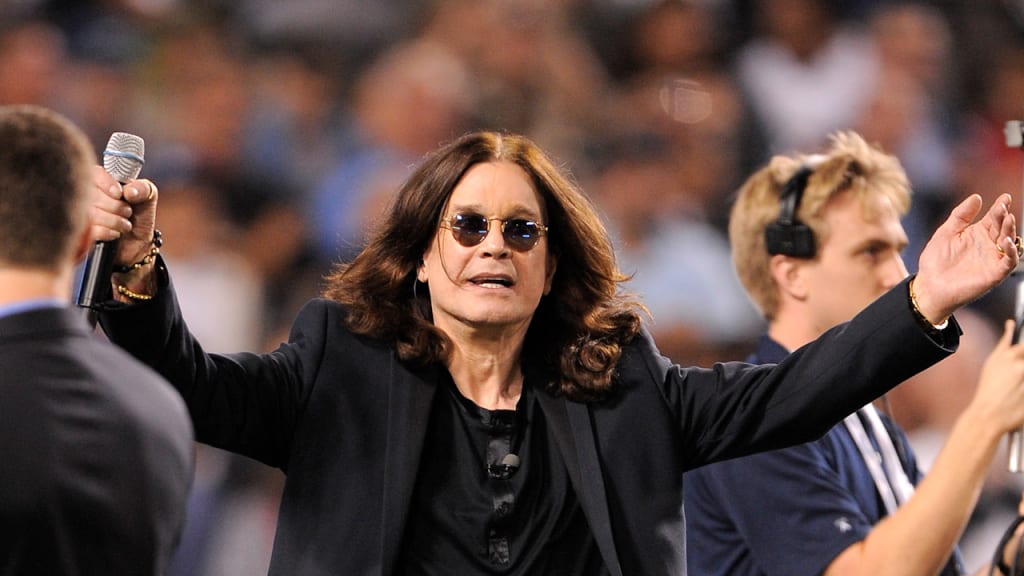The Night Ozzy Osbourne United Los Angeles in a World-Record Scream

On a warm June evening in Los Angeles in 2010, the city’s legendary Dodger Stadium buzzed with anticipation. It wasn’t just because of the baseball game between the Dodgers and the Angels; something far more unusual and unforgettable was about to happen. As the sun dipped low, the crowd felt a current of electricity, as if something big was building in the air.
Ozzy Osbourne, the self-proclaimed Prince of Darkness, was there—not to perform a concert, but to unite an entire stadium in a world record attempt. Few artists in history could electrify a crowd with just their presence the way Ozzy could. Even after decades of performing, his ability to stir excitement hadn’t faded. The L.A. crowd knew they were about to take part in something wild.
In the fifth inning, the stadium lights shone down as Ozzy took the field, clad in his trademark black, his eyes full of that mischievous spark fans had come to love. This wasn’t about music, but about collective energy and the power of one man to rally thousands. Ozzy stood at home plate, arms outstretched, ready to lead.
The goal that night was both simple and audacious: set a Guinness World Record for the loudest and longest crowd scream. It was also the launch event for his album “Scream” and a fundraiser for ThinkCure!, a foundation dedicated to cancer research. But for Ozzy, it was more than promotion—it was a moment to bring people together for a cause that mattered.
As the announcer called for silence, you could feel the suspense—52,000 voices about to become one. Then, with a cue from Ozzy, the stadium erupted. For a full, thunderous minute, the sound was overwhelming, echoing off the concrete and into the summer sky. It wasn’t just noise; it was catharsis, unity, and even healing for a city that had seen its share of hard times.
Children screamed next to grandparents, die-hard fans beside first-time concert-goers. Cancer survivors joined hands with those still fighting. For that brief minute, everyone forgot the worries of their daily lives and let loose, their collective voice rising higher than the city’s famous palm trees. It was proof that music and community have the power to break boundaries—even world records.
The Guinness officials measured the sound with meticulous precision. As the seconds ticked by, the energy only grew. When the final decibel count came in—shattering previous records—the stadium exploded in cheers all over again. Ozzy’s face lit up with genuine delight. Despite his “dark” image, he looked every bit the proud father of the moment, having inspired thousands to scream together for something good.
For Ozzy, who had faced battles with addiction, illness, and the relentless churn of fame, this night was a reminder of what truly mattered. Standing at the center of that storm of voices, he could see how much people still loved coming together, no matter what brought them to the stadium. He once said music saved his life—now, his music and energy were giving others a reason to shout, to live, to hope.
The event was about breaking records, but it was also about breaking through isolation. In a world that so often divides, for one minute, the divisions fell away. Ozzy stood not as an untouchable rock god, but as a unifier—a reminder that sometimes, the simplest acts, like screaming your lungs out, can bring about the deepest connections.
After the event, videos and stories spread quickly online. Fans recounted how the scream echoed not only through the stadium, but through their hearts. Social media buzzed with pride. Ozzy’s “Scream” album would go on to sell around the world, but nothing could replicate the feeling of that single, shared moment under the Los Angeles sky.
Years later, the memory of that night still brings chills to those who were there. For some, it was a once-in-a-lifetime story to tell their kids. For others, it was a turning point—a release of years of pain or stress, wrapped up in the joy of screaming together. The cause itself, raising money for cancer research, gave the event a sense of purpose that reached beyond music.
As the record was announced, Ozzy waved to the crowd, his voice cracking with emotion. There was gratitude in his eyes—a rock star still amazed that so many people would follow his lead. For a man who had once been an outcast, that acceptance meant everything. The stadium felt like one big family.
The moment was immortalized in news clips and YouTube videos, amassing millions of views. New fans discovered Ozzy’s music through the story, and older fans felt a renewed connection to the artist they’d followed for decades. Even after the record was broken by others, nothing could replace the heart of that L.A. night.
In the years since, Ozzy’s health struggles and eventual passing have made the memory of that event even more precious. It stands as a testament to his ability to bring people together and to the power of music to inspire even the simplest, loudest, most joyful acts. No matter what darkness Ozzy embraced on stage, moments like this revealed his true legacy—one built on love, unity, and living life as loudly as possible.
For everyone who screamed that night, the sound still lingers, not just in their ears but in their souls—a memory of being part of something bigger, something that, just for a minute, felt eternal.





